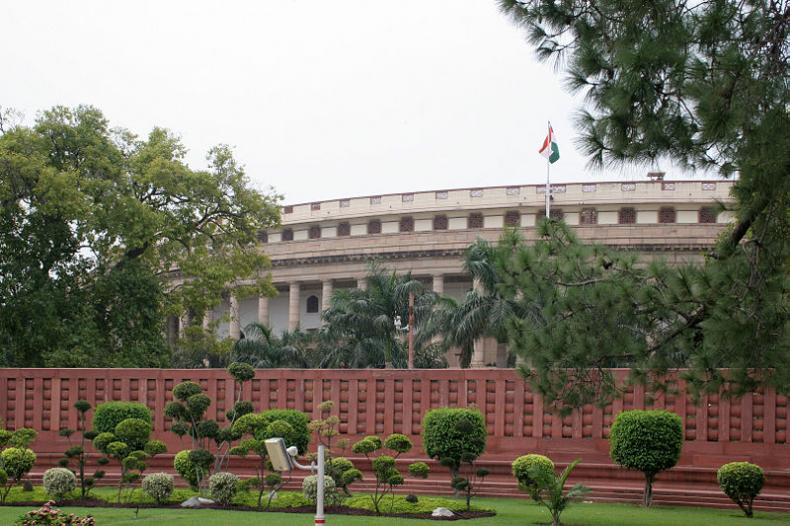
Parliament faced record-low levels of productivity this session, with mainly the Delhi pecuniary jurisdiction bill and cheque bouncing bill squeezing through.
The Monsoon session of Parliament scheduled from 21 July 2015 came to an end yesterday (13 August) after 18 days.
While the Rajya Sabha managed to work only for 9% of its scheduled time due to disruptions; Lok Sabha performed a little better by catching up midway in the session and reaching a productivity level of 48%, reported PRS India.
Out of the 11 bills listed for consideration and passing during the session, only the Delhi high court (Amendment) Bill, which had been passed by the Rajya Sabha in the previous session was passed by Lok Sabha in this session. Legally India had reported the passage of the bill which increases the pecuniary jurisdiction of the Delhi high court.
While the Lok Sabha passed four bills in this session, the Rajya Sabha passed none. A total of eight bills were introduced during this session.
PRS president MR Madhavan [http://www.livemint.com/Opinion/hzQFu9FUkYgAiRhwuHoipL/The-real-cost-of-disrupting-Parliament.html argued in Mint today that the real cost of parliamentary delays ran to thousands of crore rupees].
Bills passed:
- The Scheduled Castes and the Scheduled Tribes (Prevention of Atrocities) Amendment Bill, 2014
- The Negotiable Instruments (Amendment) Bill, 2015
- The Delhi high court (Amendment) Bill, 2014
- The Repealing and Amending (fourth) Bill, 2015
The Negotiable Instruments (Amendment) Bill was introduced and passed in the Lok Sabha in the monsoon session. The Supreme Court had in the Dasrathrup Singh Rathod case held that a complaint of dishonour of cheque can be filed only to the court of the jurisdiction of the bank on which a dishonoured cheque was drawn.
After this case, the Negotiable Instruments (Amendment) Ordinance, 2015 was passed]. The bill passed by the Lok Sabha seeks to amend the Act and clarify that in cases of cheque-bouncing, filing is to be done in a court under whose jurisdiction the bank branch of the payee (person who receives the cheque) lies.
GST: Unlikely by April 2016
Perhaps, one of the most important bills to be considered in this session by the Rajya Sabha was The Constitution (One Hundred Twenty-second Amendment) Bill, 2014 (‘Amendment Bill’) dealing with the amendments in respect of the Goods and Services Tax (GST) which has been already passed in Lok Sabha. This bill was set to be introduced in the Rajya Sabha on August 11, 2015, after obtaining a report from a select committee; but was not taken up for passing due to disruptions. The government had set a deadline of April 1, 2016 for application of GST bill, which it might not be able to meet after its inability to get the bill passed in the Rajya Sabha in this monsoon session.
The Hindu Business Line reported that finance minister Arun Jaitley said: “The CCPA (Cabinet Committee on Parliamentary Affairs) has decided not to prorogue [discontinue] the session as yet. We will make our own assessment.”
This means that the government can, with the support of other parties call for reconvening of the Monsoon session for a few days.
Economic Laws Practice (ELP) stated in a client alert:
Another session will be required for the Rajya Sabha to pass the Amendment Bill, although there is some rumour of a special five-day session of Parliament starting August 31, 2015 to have the Amendment Bill passed...
In the present circumstances, it appears very likely that April 01, 2016 may not see the roll-out of GST, given the following further prior steps to be achieved:- The Amendment Bill will have to be passed by at least two-third majority of the Rajya Sabha;
- Subsequent ratification by at least half of the States’ Legislatures; and
- Assent of the President of India.
The other milestones to be met to embrace GST are:
- Drafting of the proposed statutes, both for centre and states;
- Setting up of the GST Council, which then has the mandate of making some crucial decisions;
- Setting up and integration of the administration mechanism / authorities; and
- Implementing the IT infrastructure and backbone.
It is believed that the delay will enable more thought and qualitative time for these activities.
In the meanwhile, industry and trade will do well to have their house in order by:
- Ironing out open and contentious issues of the present taxation regime and winding down litigation, where feasible; and
- Undertaking a deep-dive on tax positions and policies to correct deviations and also achieve optimisation (for e.g. credits) but, more importantly set the tone for GST
threads most popular
thread most upvoted
comment newest
first oldest
first
threads most popular
thread most upvoted
comment newest
first oldest
first